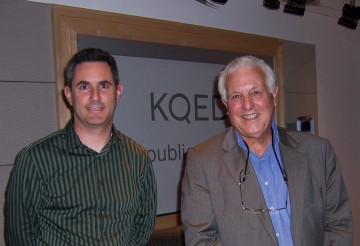InterACT: Tune in to Forum Discussion of Common Core

A previous Forum experience – in the studio at KQED with Spencer Michels. We were discussing teacher evaluation (8/18/10).
A previous Forum experience – in the studio at KQED with Spencer Michels. We were discussing teacher evaluation (8/18/10).
[8/1/13 edits: updated to past tense, noted changes in lineup, and added final thoughts]
I was among the guests on KQED Forum Thursday morning, August 1, in the 9-10 a.m. hour, discussing the Common Core Standards and their implementation. KQED is an NPR affiliate (88.5 FM in San Francisco, or listen live online), and Forum may be their most popular locally produced program. They do a good job of promoting thoughtful dialogue on all sorts of issues, so I hope people who missed the live broadcast will listen to the recording later. You can use that link to add comments, or their Facebook page, to add your comments.
Here is the full line-up (pasted from KQED webpage):
- Alice Mercer, 6th grade teacher at Bancroft Elementary School in Sacramento
- Arun Ramanathan, executive director of the Education Trust-West, an Oakland-based educational policy and advocacy organization focused on low-income and minority students
- David B. Cohen, Associate Director of Accomplished California Teachers; English teacher at Palo Alto High School
- Eric Hanushek, Paul and Jean Hanna Senior Fellow at the Hoover Institution
- Jill Tucker, education writer for the San Francisco Chronicle
- Tom Torlakson, state superintendent for public instruction; and former member of the CA State Assembly for the 11th District
I won’t claim to be an expert on the Common Core Standards content: I cannot quote chapter and verse, and the coming school year will be my first actually doing anything differently because of the CCSS adoption. However, in my work with Accomplished California Teachers, affiliation with national education organizations (NBPTS, Teacher Leaders Network) and years of presenting and participating in state and national conferences, seminars, and workshops, I have gathered and understood many perspectives on the standards and their implementation. It’s essential for policy makers and the public to understand what this process looks like and feels like in a wide variety of settings, and how this implementation will alter – for better, worse, both? – the teaching and learning in classrooms.
I knew from past experience it would be impossible to say everything I’d like to say in this radio program, so I’m adding a few comments here, and providing links to my blog posts on the topic. First, I noticed some comments on the KQED page, wondering where the critics were. I agree it would have been good to have a strong opposing voice in the mix, and I know they tried to reach Anthony Cody. There are many opposing voices reflected in the comments in blog posts below, and welcome divergent views on this post as well. I think the show touched on the costs and the testing problems, but would also have benefitted from discussion of how Race to the Top and NCLB waivers turned the CCSS adoption process into something that felt more rapid and coercive rather than thoughtfully debated.
A couple of times I would have liked to interject on the topic of teacher preparation and training. The necessity of doing that was acknowledged, but we need a shift in the way California’s and America’s teachers engage in professional learning. Compared to teachers in most leading nations in education, American teachers spend more hours in front of students and have less time to make professional learning and collaboration a regular part of their day. We don’t need more workshops and binders and trainings from consultants; we need more opportunity for teachers to learn and work together on everything they need to do to improve teaching and learning – CCSS-related or not.
I was glad to hear Hanushek and Ramanathan sounding so measured and reasoned regarding the relative importance of teaching vs. testing. They have generally been advocates of policies that attach high stakes to standardized test results. With regard to the CCSS transition ahead, I hope they’ll remain as moderate in their views. California State Board of Education Michael Kirst is a highly-regarded education researcher and policy expert, and he has stated that with a new assessment system like this, you’d need at least three years of data before you begin to understand what it might reveal. It’s certainly not time to slap old notions of accountability on new assessments and carry on with the failed test-label-blame-punish cycle that NCLB brought us.
I agreed with Hanushek that the Common Core debate is less important than some others we should be having, though he and I would disagree on how those larger debates should be resolved. Standards and assessments are not going to be the engine for lasting systemic improvement. As this transition unfolds, plenty of schools and students are going thrive without Common Core standards, whether they’re in states that haven’t adopted the standards, or in private schools that can do what they want in any case. Schools and systems thrive when they have ample resources, stable governance and funding sources, collaborative professional environments, and appropriate supports for children and teachers.
Here are my prior blog posts regading Common Core. Keep in mind that these posts span a couple of years, and as time has passed, my position has evolved slightly. I’m listing them in reverse chronological order.
Common Core Presentations and Ommissions (4/2/13)
ASCD Conference Day 3: Will the “Common Core Work For You”? (3/23/13)
ASCD Conference Highlights: Day 2 (3/18/13)
Common Core: Implications of Collaboration (1/24/13)
Less Testing, Not Different Tests (6/15/11)
Common Core Confusion – ASCD Edition (3/26/11)
Common Core Confusion (3/11/11)
And here are some InterACT guest posts relating to Common Core:
Common Questions about Common Core, by Chris Miraglia
Teaching the Common Core: Debate Continues , by Alice Mercer
Common Core Challenges for California, by Alice Mercer
Getting Less From More, by Jane Fung
This blog post has been shared by permission from the author.
Readers wishing to comment on the content are encouraged to do so via the link to the original post.
Find the original post here:
The views expressed by the blogger are not necessarily those of NEPC.
